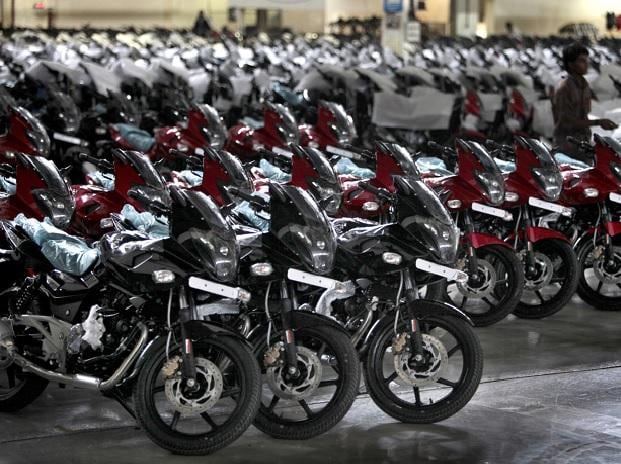Even though it beat estimates, the net profit of the two-wheeler firm fell sequentially to Rs 1,061 crore in the April-June period. The drop comes on the back of Covid-induced lockdowns that stalled production and shut dealerships.
A Bloomberg poll of analysts pegged the number at Rs 992 crore. The year-on-year net profit of the firm rose 50.2 per cent to Rs 1,061 crore, but the earnings are not strictly comparable to Q1 of FY21 due to the nationwide lockdown at that time.
Overall vehicle sales, including exports, at the maker of Pulsar motorcycles and RE three-wheelers fell 14 per cent sequentially to 1,006,014 units in the reported quarter as the pandemic upended lives in urban as well as rural India. The company’s revenue during the quarter also declined sequentially to Rs 7,386 crore from Rs 8,596 crore. The lower volumes and higher raw material prices singed margins, pulling it down to 15.6 per cent in the June quarter from 18.1 per cent in the March quarter.
Lower revenue from operations resulted in the loss on spread of fixed costs by 160 bps. Increase in the cost of raw-material, net of increase in prices, resulted in lower Ebitda margin by 220 bps, while the fall was cushioned, to some extent, by higher dollar realisation and improved mix, the company said in the statement.
“It was a tough quarter as the volumes didn’t pan out the way we had expected. Going into the quarter, in March, the severity of the second wave was not known. By the end of March, it engulfed the whole country — first the north and then the south,” said Rakesh Sharma, executive director, Bajaj Auto. The lesser-than-expected volumes also impacted Bajaj’s operating leverage.
Sharma said things have started looking up since the second half of June — particularly for three-wheelers, in which Bajaj is a market leader in all segments. The company retailed 7,000 three-wheelers, as against the expected 5,000. Though the monthly run rate is far lower than what it was in FY20 — when it retailed an average of 25,000-30,000 units — the month-on-month improvement is encouraging, he said.
Meanwhile, the company’s exports have been steady at 200,000 units a month. It is expected to get better once the lockdowns in Uganda and The Philippines are lifted.
According to Sharma, the September quarter may be better than the year-ago quarter on all fronts — exports, domestic motorcycle and three-wheelers.
Mitul Shah, head of research at Reliance Securities, expects Bajaj’s exports to witness a healthy growth in FY22E (estimates) on the back of positive traction in the African market. He also expects the domestic two-wheeler industry to recover Q2FY22E onwards.
“Domestic three-wheeler business would bounce back strongly in FY22E. In view of healthy exports, recovery in high margin three-wheeler business, margin expansion, improving return ratio and strong balance sheet, we have a ‘buy’ rating on the company for a two-year target price of Rs 3,870,” said Shah.
On the formation of a wholly-owned subsidiary to sharpen focus for the electric mobility segment, the company said in a statement: “The wholly owned subsidiary will leverage the growth opportunities in the evolving mobility space and will help the company to venture into the manufacturing of electric and hybrid vehicles in the 2-wheeler, 3-wheeler and light 4-wheeler categories.”
A corporate structure will allow us to partner, get into alliances and give us the flexibility to move with a greater speed. All the EV business will get into this company,” said Sharma.
 Dear Reader,
Dear Reader,
Business Standard has always strived hard to provide up-to-date information and commentary on developments that are of interest to you and have wider political and economic implications for the country and the world. Your encouragement and constant feedback on how to improve our offering have only made our resolve and commitment to these ideals stronger. Even during these difficult times arising out of Covid-19, we continue to remain committed to keeping you informed and updated with credible news, authoritative views and incisive commentary on topical issues of relevance.
We, however, have a request.
As we battle the economic impact of the pandemic, we need your support even more, so that we can continue to offer you more quality content. Our subscription model has seen an encouraging response from many of you, who have subscribed to our online content. More subscription to our online content can only help us achieve the goals of offering you even better and more relevant content. We believe in free, fair and credible journalism. Your support through more subscriptions can help us practise the journalism to which we are committed.
Support quality journalism and subscribe to Business Standard.
Digital Editor

RECOMMENDED FOR YOU